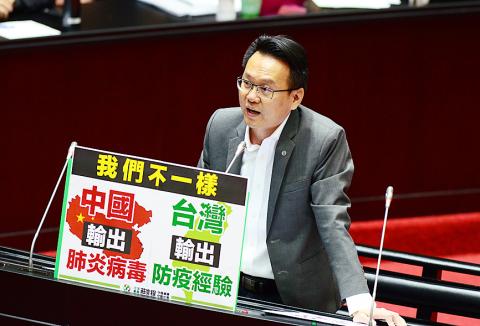Premier Su Tseng-chang (蘇貞昌) yesterday said that he would ask government officials to assess the possibility of holding an online conference with international disease prevention experts to pass on the nation’s methods for containing COVID-19.
Su made the remark when asked by Chinese Nationalist Party (KMT) Legislator Charles Chen (陳以信) whether Taiwan — which last month participated remotely in a WHO forum on critical research and the development of vaccines, therapeutics and diagnostics — could convene an online conference on ways to contain the novel coronavirus.
As Taiwan has been the most successful nation in limiting the spread of the virus, the government could help other nations by inviting international disease prevention experts to participate in the conference, Chen said.

Photo: Wang Yi-sung, Taipei Times
The nation should capitalize on the opportunity with its first-rate disease prevention experts, such as Minister of Health and Welfare Chen Shih-chung (陳時中) and Minister Without Portfolio Audrey Tang (唐鳳), who excels at holding online conferences, he said.
The nation should “show the world its loss for excluding [Taiwan] from the WHO,” he added.
The Ministry of Foreign Affairs last week asked Chen Shih-chung to educate Taiwan’s foreign representatives on the nation’s disease prevention efforts in the hope of sharing such information with other nations, but the move would likely not be effective, as diplomats are not disease prevention specialists, Charles Chen said.
Convening an online conference on containing the virus would give the nation a perfect opportunity to raise its international profile and make its greatest contribution yet to global public health, he said.
Asked whether he was willing to test the proposal, Su said: “Yes.”
Charles Chen also requested that Mainland Affairs Council Minister Chen Ming-tong (陳明通) identify who was in charge of negotiations for a second set of charter flights that evacuated 361 Taiwanese from Wuhan, China.
Chen Ming-tong declined to comment on the details of the negotiations out of concern that it could affect talks on further efforts to bring back Taiwanese stranded in Wuhan.
The council would take lawmakers’ questions after all negotiations have ended, he said.
Su said that the negotiations were not conducted between the governments on the two sides of the Taiwan Strait, but by “relevant parties” acting on the governments’ instructions.
“We hoped to bring back our people, and we did, after many twists and turns… We hope to bring back many more people, so we will not reveal too much” about the negotiations, he said.
When told by Charles Chen that many people were “disheartened” after it took the government more than a month to arrange the second set of evacuation flights, Su said: “That is the result of ‘the other side’ insisting on this and that, which gave us a lot of trouble.”

Taipei has once again made it to the top 100 in Oxford Economics’ Global Cities Index 2025 report, moving up five places from last year to 60. The annual index, which was published last month, evaluated 1,000 of the most populated metropolises based on five indices — economics, human capital, quality of life, environment and governance. New York maintained its top spot this year, placing first in the economics index thanks to the strength of its vibrant financial industry and economic stability. Taipei ranked 263rd in economics, 44th in human capital, 15th in quality of life, 284th for environment and 75th in governance,

The Sports Administration yesterday demanded an apology from the national table tennis association for barring 17-year-old Yeh Yi-tian (葉伊恬) from competing in the upcoming World Table Tennis (WTT) United States Smash tournament in Las Vegas this July. The sports agency said in a statement that the Chinese Taipei Table Tennis Association (CTTTA) must explain to the public why it withdrew Yeh from the WTT tournament in Las Vegas. The sports agency said it contacted the association to express its disapproval of the decision-making process after receiving a complaint from Yeh’s coach, Chuang

Control Yuan Secretary-General Lee Chun-yi (李俊俋) tendered his resignation last night, admitting that he had misused a government vehicle, as reported by media. His resignation was immediately accepted by the Control Yuan. In a statement explaining why he had resigned, Lee apologized for using a Control Yuan vehicle to transport his dog to a pet grooming salon on May 20. The issue first came to light late last month, when TVBS News reported that Lee had instructed his driver to take the dog to the salon. The news channel broadcast photos that it said were taken by an unnamed whistle-blower, which purportedly showed the

A former officer in China’s People’s Liberation Army (PLA) who witnessed the aftermath of the 1989 Tiananmen Square massacre has warned that Taiwan could face a similar fate if China attempts to unify the country by force. Li Xiaoming (李曉明), who was deployed to Beijing as a junior officer during the crackdown, said Taiwanese people should study the massacre carefully, because it offers a glimpse of what Beijing is willing to do to suppress dissent. “What happened in Tiananmen Square could happen in Taiwan too,” Li told CNA in a May 22 interview, ahead of the massacre’s 36th anniversary. “If Taiwanese students or